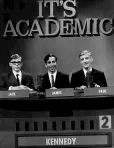 No, I’m not writing about this. While visiting New Music Box for its Robert Carl postings, I read Daniel Felsenfeld’s essay on the use of the word “academic” in reference to composers. The comment section is extensive. I want to point out a few things that you would think are painfully obvious, but don’t seem to be obvious to some of the commenters:
No, I’m not writing about this. While visiting New Music Box for its Robert Carl postings, I read Daniel Felsenfeld’s essay on the use of the word “academic” in reference to composers. The comment section is extensive. I want to point out a few things that you would think are painfully obvious, but don’t seem to be obvious to some of the commenters:
- there are people writing interesting music and people writing lousy music; some of each kind get academic paychecks, some of each kind do not. You cannot reliably predict what a composer’s music is like in terms of style or quality on the basis of that composer’s W-2.
- considerable power and privilege accrues to many composers with academic positions. Many composers outside academia also hold institutional positions of power and privilege.
- there is no one model for being a composer in academia. As Jennifer Higdon notes in the comments section of Felsenfeld’s post, her status as a member of the Curtis faculty plays a relatively modest role in how she earns her living, and some of the privileges you would think of as basic for any faculty member are absent in her case.
- the degree of interaction of the composer who draws an academic paycheck with the musical world outside the university can vary widely. Note Barbara White’s mention of her work with musical amateurs in the New Music Box comments section. I have a day job at a university, but I have also written a good many lead sheet style songs (in what one friend disparagingly calls the “happy-clappy” pop idiom of contemporary Catholic liturgical practice in this country) for church congregations to sing. I don’t think I am necessarily a better or worse composer for having written those - though, in the light of Kyle Gann’s post (see below) perhaps the professionalism I have sought in those pieces has been a good influence on my concert music.
I think the overwhelming presence of the pop music industry makes academic connections a source of anxiety in our field in a way that other arts do not experience. Do you love Marilynne Robinson’s Gilead more or less because she is on the University of Iowa faculty? You maybe didn’t even know she teaches there. Some pretty famous painters, folks whose pieces can at times sell in six figures, will take up an adjunct or visiting artist position when the vagaries of the art market temporarily reduce their gallery income - and nobody worries about them being academics or not.
I like what Felsenfeld has to say here:
We all know what is meant when the accusation of academicism is lobbed: that person (or their line of thinking) is cloistered, out of touch, has little bearing on the real world. But really, there is no “real world” and no “general public.”…
…when we use the idea of “academic composing” to pigeonhole other artists because we either don’t like their work or don’t agree with their methods, it becomes an unfortunate “choose a side” that all the recent important genre-leaping and boundary-crashing (or what have you) is there to eliminate. Maybe I dream, but the day that there are no “sides” but rather just individuals doing what they do (and possibly working alongside like-minded souls) will be a good day for us all.
For further reading, check out this important post by Kyle Gann - I think there is a lot of truth in the academic/professional contrast he describes.


